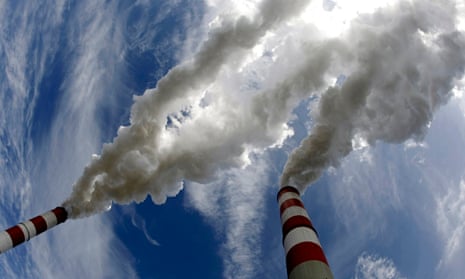Political inertia, financial short-termism and vested fossil fuel interests have formed a “toxic triangle” that threatens to push up global temperatures, putting 400 million people at risk of hunger and drought by 2060, Oxfam said on Friday, a week before an EU summit to finalise a new climate and energy policy framework.
In its Food, Fossil Fuels and Filthy Finance report, Oxfam warned that EU leaders must resist pressure from the fossil fuel industry, which spends at least €44m (£35m) a year on lobbying the European bloc. The report also urged leaders to commit to cuts of at least 55% in carbon dioxide emissions, energy savings of at least 40%, and an increase in the use of sustainable renewable energy to at least 45% of the energy mix.
EU leaders meet in Brussels on 23-24 October to agree targets for emissions cuts by 2030, deployment of renewable energy and improving energy efficiency. The meeting comes ahead of the UN climate change conference in Paris next year. The leaders are expected to agree an emissions cut target of 40% from 1990 levels, but Oxfam said this would not be enough for Europe to make a fair contribution to tackling climate change. The EU emits about 10% of global carbon dioxide.
“The fossil fuel industry has conjured a toxic triangle that is trapping us into a warming world. Governments and investors are helping the industry to recklessly protect its own profits at the expense of us all. The world’s poorest are already being hit hardest and millions more will be made hungry by climate change,” the Oxfam chief executive, Mark Goldring, said.
Oxfam says the “toxic triangle” supported spending of more than $674bn (£423bn) on fossil fuels in 2012. Investment in the industry was propped up by tax breaks, government incentives and an estimated $1.9tn of subsidies a year. More than $500,000 a day was being spent on lobbying US and EU governments, it says.
Progress has been made, the report says, citing the proposal of the US president, Barack Obama, to cut carbon emissions in the power sector by 30% from 2005 levels by 2030, and discussions in China on “an absolute carbon cap” after 2016.
“These commitments and proposals all demonstrate that the international community is beginning to wake up to the reality of climate change and adopt the necessary rhetoric. Yet carbon emission reduction offers on the table so far are not significant enough to advance the necessary transition, and thereby shift private and public finance accordingly,” the report says.
Stephen Tindale, an associate fellow at the Centre for European Reform, argued in a September report that “inefficient fossil fuel subsidies” needed to be stopped in Europe, in line with a G20 commitment made in 2009.
“Ending them will save or raise substantial sums for governments. Spending on energy efficiency is economically efficient as well as socially beneficial. And investment in new energy technologies will enable European companies to compete in export markets. European governments should give much of the revenue from the phasing out of direct and indirect subsidies for hydrocarbons to the Green Climate Fund,” he wrote.
The UN’s Green Climate Fund aims to help developing nations tackle the consequences of climate change, such as increased flooding, and invest in cleaner energy.
Oxfam says fossil fuel companies would spend about $6tn to develop the industry over the next decade, despite fossil fuels being responsible for 80% of carbon dioxide emissions and the main contributor to climate change, which threatens health, property, food, businesses and economic growth. It says this investment is flawed, because regulation limiting warming to 2C could leave $300bn of fossil fuel assets stranded, bursting the “carbon bubble” and leaving savers and long-term investors out of pocket.
Oxfam urges governments to phase out fossil fuel emissions and introduce sustainable renewable energy for all by early in the second half of the century. It also wants governments to shift investment to renewables, energy efficiency and policies to make sure the poorest people are able to access energy. It argues for more transparency around lobbying and urges governments to “climate proof” the global financial system by reviewing risk, improving transparency and providing capital for low-carbon investment.
Fossil fuel and energy-intensive companies in the private sector must diversify their business models to embrace a low-carbon future, and investors should put money into low-carbon development and challenge firms that pursue high-carbon strategies, it says.
“If fossil fuel use globally continues unabated, severe climate change impacts on the poorest people will be unavoidable. Despite apparent global aspirations to keep global warming below 2C – and associated commitments from a range of countries – so far this has not been sufficient to achieve the necessary financial shift away from fossil fuels and into clean energy alternatives,” the report says.
“This ‘toxic triangle’ of political inertia, financial short-termism and vested fossil fuel interests must be broken if the world is to seize the multiple opportunities – in rich and poor countries alike – for a low-carbon transition.”

Comments (…)
Sign in or create your Guardian account to join the discussion